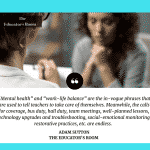My Colleague and Friend is Immunocompromised
Imagine wearing a mask for COVID-19 protection in school when everyone else has decided they are no longer needed. You wear protective latex gloves, your hands are dry, sore, and severely chapped from overwashing, and you fear for your life as you enter the classroom each day. Well, this is the reality for my friend and colleague Cedric, an early childhood special education teacher who is immunocompromised. I asked Cedric about teaching amid a persisting pandemic that seems to have ‘faded’ into the background for many. He shared, “The main thing I want to do is my job, and [I] want to be safe.”
Most teachers enter the school year anxious about preparing engaging lesson plans and establishing effective classroom routines. They are eager for the start of a new school year and look forward to welcoming a class of new students. Cedric is most anxious about what precautions must be taken to ensure that his classroom is a healthy and safe environment for him to teach and engage students.
As an immunocompromised teacher, Cedric must approach the planning of a new school year quite differently than his colleagues. Constantly faced with the decision of pursuing his livelihood and passion of being a classroom teacher or walking away because the very thing he loves most could compromise his well-being, Cedric’s choices are literally a matter of life or death. A student cough, which may have been dismissed in a colleague’s classroom, recently led to Cedric being hospitalized for more than two weeks with an oxygen tank and a diagnosis of pneumonia.
The absence of COVID-19 precautions could worsen flu season, but they also make it unsafe for Cedric to engage with his students and teaching colleagues. As he contemplates the new CDC streamlined COVID-19 guidance and its impact on his personal and professional life, he acknowledges that his daily life remains severely disrupted by the pandemic. Therefore, Cedric proposes the following recommendations for school and district leaders:
Choose to Listen to Immunocompromised Teachers
It is imperative to understand what procedures and practices most support members within school communities, students and teachers, who are immunocompromised and at risk of contracting acute illnesses. School and district communities must foster dialogue to better gain perspective about what is supportive and not supportive of those most impacted by established health plans and policies. Cedric shared, “I want to protect my life and be an effective teacher.” He seemed solemn as we discussed his approach to instruction and engagement with students who require close physical proximity and an actual hand-over-hand approach to learning experiences – all of which can be dangerous to Cedric’s health.
I worry about how Cedric is impacted by district and school administrative decisions to sunset COVID mitigation strategies. I most worry about him not being a part of the conversations that have led to these decisions. School and district officials must choose to listen – to initiate a collective conversation with immunocompromised educators (and families of immunocompromised students) – to heed their concerns about the mitigation strategies that have significant consequences for their lives.
Be More Empathic and Compassionate to Immunocompromised Teachers
Empathy is more than listening. It is understanding. Yet we must be cautious of empathizing without action. To ensure learning environments are safe and secure places for all, we must be more understanding. We have to acknowledge that each member of the school community has uniquely different needs. “Stop putting them in a box!” Cedric replied when I asked him what leadership could do to support teachers who are immuno-compromised.
Meeting the needs of all members of the school community can be daunting. There is no one size fits all approach, but there are things leaders can do to ensure every individual’s health is protected. Cedric asserted, “I don’t want to go out on disability; I want to work.” He noted that his students need him, and he wants to be there for them. Leaders must take time to lean into the discomfort of perspective-taking and ask themselves, “Are we empathic if we don’t take action?”.
Establish Effective Protocols to Protect Immunocompromised Teachers
“I think daily cleaning should have been [extensive]!” Cedric informed me that he often would walk into his classroom and notice that only the trash had been emptied. How could he trust that the classrooms were being cleaned effectively if the floors weren’t mopped and the sinks weren’t sanitized consistently? Safety protocols, particularly cleaning protocols, are imperative in establishing a healthy and safe environment. In Cedric’s case, there is limited trust that the cleaning protocols were effective because they had not been consistently followed even prior to the changes in CDC COVID-19 guidance.
In order to feel safe, Cedric purchased N95 masks and a clear shield versus relying on the surgical masks given to him by the school to ensure his safety. An educator should not have to purchase their own masks and shields. Meanwhile, Cedric worries about poor ventilation in his school building. Thus, he confirmed that he would go outside to remove his mask when needed because he didn’t feel secure removing the mask in the building. Guidelines and accountability are needed to implement safety protocols to establish and maintain a safe and clean environment.
We prioritize the safety of students without hesitation. Yet teachers are often compelled to make decisions about their health and lives without meaningful or effective support from school and district leadership. It is time for us to redesign system policies considering all who belong to the system. That includes educators like Cedric, who are choosing between life and death as they enter school buildings with a dedication to meeting the needs of students and their families.

Felicia Rutledge serves as a Regional Multi-Tiered System of Supports Coordinator at the University of Nevada, Reno, supporting educators with implementation of tiered supports. She is a special education consultant & coach, Teach Plus Nevada Senior Policy Fellow and a Nevada Succeeds InspirEd Global Fellowship Critical Process Friend.






